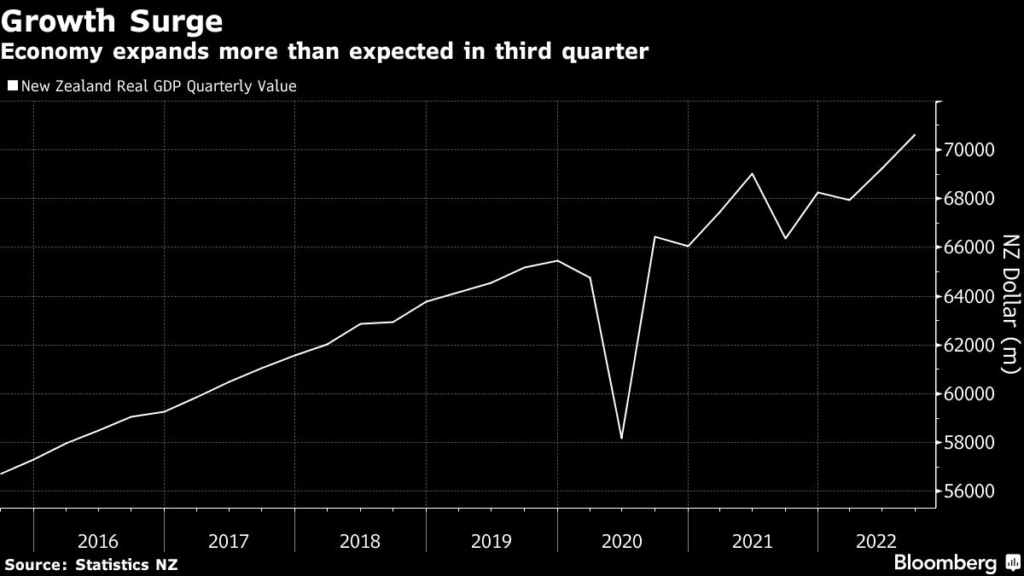(Bloomberg) — New Zealand’s economy grew more than twice as much as economists expected in the third quarter, underscoring the difficulty the central bank faces in trying to damp demand to curb inflation.
(Bloomberg) — New Zealand’s economy grew more than twice as much as economists expected in the third quarter, underscoring the difficulty the central bank faces in trying to damp demand to curb inflation.
Gross domestic product jumped 2.0% from the second quarter, when it gained an upwardly revised 1.9%, Statistics New Zealand said Thursday in Wellington. Economists forecast a 0.9% increase. From a year ago, the economy expanded 6.4%, exceeding the median estimate of 5.5%.
The data are “stupendously strong,” said Nat Keall, an economist at ASB Bank in Auckland. “The starting point for economic activity is substantially hotter than the RBNZ will have anticipated as it embarks on the remainder of the tightening cycle.”
The Reserve Bank is aiming to engineer a recession in 2023 to suppress demand and rein in inflation. Last month it stepped up its already aggressive interest-rate increases with a record 75 basis-point hike and said it would raise the Official Cash Rate, currently at 4.25%, to 5.5% next year.
The New Zealand dollar was little changed after today’s GDP release. It bought 64.58 US cents at 10:51 a.m. in Wellington. Ten-year government bond yields rose.
The RBNZ had forecast 0.8% growth for the third quarter.
The statistics agency said growth was primarily driven by services industries such as transport, which was boosted by the full reopening of the border during the quarter.
Bounce Back
Covid-19 swept the entire country for the first time at the start of 2022, triggering a contraction in the first quarter, but the economy bounced back strongly after that.
Annual inflation accelerated to 7.3% in the second quarter and eased less than expected to 7.2% in the third. Near record-low unemployment of 3.3% is fueling demand and driving up wages, adding to inflationary pressures.
Still, house prices are falling and the full impact of surging mortgage rates has yet to be felt.
Some 50% of mortgage books are yet to roll over, and some borrowers will reset from 2.5% to 6.5%, RBNZ Deputy Governor Christian Hawkesby said yesterday. Despite that, the central bank has “more work to do” to rein in inflation, he said.
The Treasury Department yesterday joined the RBNZ in predicting a 2023 recession. Both see it starting in the second quarter, with Treasury projecting three quarters of contraction and the RBNZ four.
Other details
The third-quarter expansion was led services industries, which grew 2%, the statistics agency said.
- Transport, postal and warehousing was biggest contributor, rising 9.7% from the second quarter
- Manufacturing output rose 0.1%
- Construction rose 5.1%
- Primary industries fell 0.2%
- Household spending fell 0.1%
- Retail trade and accommodation fell 0.7%
- Exports rose 7.8%, led by dairy, travel services and meat
- GDP per capita gained 1.9%
(Updates with economist’s comment in third paragraph)
More stories like this are available on bloomberg.com
©2022 Bloomberg L.P.










